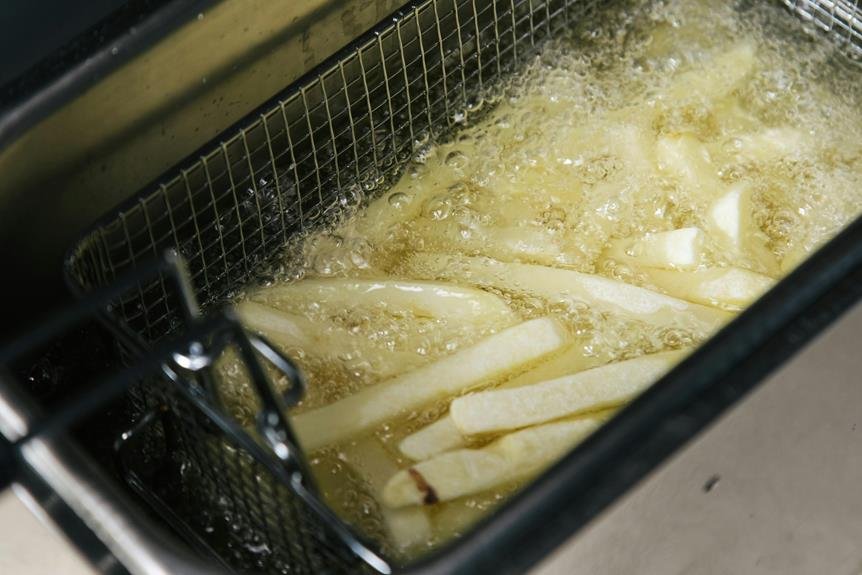
If you've ever wondered whether air fryers can truly be a healthier substitute for deep frying, the answer might surprise you. While they offer a promising way to enjoy crispy favorites with less oil, the question remains: are air fryers truly a better choice for your overall health? Let's explore the science behind air frying and its impact on the nutritional value of your favorite foods.
Health Benefits of Air Fryers
Are air fryers truly a healthier alternative to deep frying, or is it just a marketing gimmick? Let's delve into the health benefits of using an air fryer.
One significant advantage is the drastic reduction in oil usage. Traditional deep frying requires submerging food in oil, leading to high calorie and fat content. However, air fryers use only a fraction of the oil, resulting in lower fat intake. By cutting down on oil, air frying can help you maintain a healthier diet without sacrificing the crispy texture you love.
Additionally, air fryers are praised for their ability to retain nutrients better than deep frying. The rapid air technology cooks food quickly at high temperatures, sealing in vitamins and minerals that may be lost in traditional frying methods. This means you can enjoy the same delicious taste with more nutritional value.
Moreover, air fryers produce less harmful compounds compared to deep frying. When oil is heated to high temperatures, it can create harmful compounds that may contribute to health issues. Air frying significantly reduces the formation of these compounds, making it a safer cooking method.
Nutritional Comparison With Deep Frying
When comparing the nutritional value of food cooked in air fryers versus deep frying, significant differences emerge in fat and calorie content. Air-fried foods typically contain significantly less fat than their deep-fried counterparts. This is because air fryers use hot air to cook food, requiring only a thin layer of oil to achieve a crispy texture, while deep frying submerges food in oil, leading to higher fat absorption. For example, air-fried chicken may have up to 70-80% less fat compared to deep-fried chicken.
Moreover, air frying also results in lower calorie content in food compared to deep frying. The reduced amount of oil used in air fryers means that the overall calorie count of the food is lower. By choosing to air fry foods instead of deep frying them, you can enjoy similar textures and flavors with a lower calorie intake. This makes air fryers a healthier option for those looking to reduce their fat and calorie consumption without sacrificing taste.
Potential Drawbacks of Air Fryers
While air fryers offer a healthier cooking method, it's important to consider potential drawbacks as well. One drawback is that air-fried foods may not have the same taste or texture as traditionally deep-fried foods. Air fryers use hot air to cook food, which can result in a drier and less crispy exterior compared to deep frying. Additionally, some foods may not cook evenly in an air fryer, leading to certain parts being overcooked while others are undercooked.
Another potential drawback of air fryers is that they often have limited capacity. If you're cooking for a large family or a gathering, you may need to cook food in batches, which can be time-consuming. Additionally, air fryers can be bulky and take up a significant amount of counter space in your kitchen.
Lastly, some people may find that air fryers aren't as versatile as other cooking appliances. While they excel at cooking certain foods like fries and chicken wings, they may not be suitable for preparing a wide variety of dishes.
Tips for Healthy Air Frying
To ensure healthier air frying, consider adjusting the cooking temperature based on the specific food you're preparing. Different foods require different cooking temperatures to achieve optimal results. For items that are more delicate or cook quickly, such as vegetables or seafood, lower temperatures are recommended to prevent burning. On the other hand, foods like chicken or potatoes may benefit from slightly higher temperatures to ensure thorough cooking.
Another tip for healthy air frying is to limit the use of oils and fats. While air fryers require significantly less oil than traditional frying methods, it's still important to use them sparingly. Consider investing in a good quality oil sprayer to evenly coat your food with just a small amount of oil before air frying.
Additionally, try to avoid breading your foods excessively. While a light coating can add flavor and texture, too much breading can increase the calorie and fat content of your dish. Opt for whole wheat breadcrumbs or panko for a healthier alternative. By following these tips, you can enjoy delicious air-fried foods that are better for your overall health.




